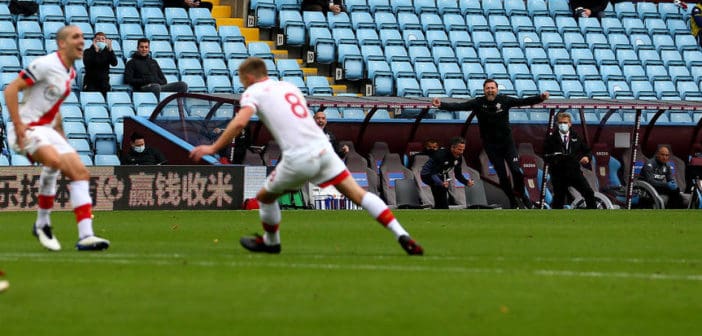Don’t let the youthful schoolboy looks of James Ward-Prowse fool you.
Make no mistake, he is the ring leader for Southampton’s source of clever deception and has been for a while.
It was his 26th birthday on Sunday and is well into his eighth season in the top-flight. He is now the captain with over 200 appearances racked-up. He’s been there throughout Saints’ ascent into Europe, to their plunge towards the Premier League basement, scrabbling around for points in perplexing, desperate fashion.
He’s seen the great and the good come and go through the Staplewood doors, and witnessed the bad and the ugly arrive and leave in similar manner.
In other words, he has seen it all.
And yet, he still carries the look of a man that gets asked for I.D when wondering into his local supermarket. He might be a husband and a father to his son Oscar, but still carries the look of a man that tells you his age and yet, you seem to find your eyebrows raising unintentionally through sheer surprise. Ward-Prowse has been around the block, but never appears to look any different, ostensibly.
Ultimately, his performance against Aston Villa will centre around the two laser-guided free-kicks he produced within 12 minutes of each other. Both timed, executed and delivered on a six pence in quintessential Ward-Prowse fashion. However, that type of custom-built armoury has been exhibited throughout the annuals of his career. In 2014, when Ronald Koeman would marvel at his after training free-kick drills, he had it.
Go back even further to his break-out 2012/2013 season, when he was bestowed the honour of standing over set pieces – sharing the noble art with a certain Rickie Lambert – he had it. Heck, he’s now surpassed Matthew Le Tissier’s club record of seven goals from direct free-kicks – it shouldn’t be a shock anymore.
Not when every televised game of Southampton gives you an incessant reminder of Ward-Prowse being a ‘dead-ball specialist.’
Everyone knows the magnificent quality and proficient ability he has in the set-piece department. It has long been his chief weapon, his trademark, the genuine high-level virtue that kept Ward-Prowse in and amongst the team, even during the apex of the Pochettino and Koeman years.
Though the snag stopping Ward-Prowse from reaching the next level and flourishing at the same lineal rates akin to Saints’ youth products of yesteryear, was what he did when the ball was live. He was this soft-touch, pitter-patter footballer. Someone that worked hard and smart, all of which was highly commendable, but never really stuck his chest out when the seas got turbulent or when tempers became frayed.
Sure, he could produce the odd whipped delivery – with far more varying degrees of success than today – but was never going to spearhead an upturn in Southampton fortunes.
How far he’s come.
Under Ralph Hasenhuttl, James Ward-Prowse is a footballer transformed, a severe turnaround to what he had been and how he was perceived. In a sporting sense, he’s become a man. Not only has his transformation typified the team’s own metamorphosis, but he now heads up an ensemble of dark art masters, all capable of living rent-free in opponent’s minds. Ward-Prowse still retains his heavenly technical gifts, but compliments it with a throwback bite.
James Ward-Prowse is the embodiment of Southampton psychological transformation. It is an intangible knack that is a rarity in the modern game. A manager developing a team’s play is hard enough, but reconfiguring how they think too? Wow.
Ward-Prowse is just the ‘nice guy’ who exploited his outward boyish features to develop his expertise in football’s dark arts. So, once again, let us hand out a reminder; don’t let his fresh-faced looks fool you, James Ward-Prowse is an annoying pest, a niggly little so-and-so. But if he can’t get you, perhaps made redundant through a booking, there is no shortage of takers prepared to take on the mantle.
As this writer has done in the past, you can wax lyrical in regards to Hasenhuttl’s thrilling brand of football, or fine nuances in system. But what arguably supersedes all is the shift in mentality. Hasenhuttl has altered the rational, the way of thinking in football’s most cutthroat league. Not only have Saints shown they are willing to roll up their sleeves in treacherous times, but they now revel in the chaos.
In the 12th minute against Villa, Darren England dished out a yellow card to Ward-Prowse for his foul on Bertrand Traore. This meant Southampton’s primary shithouse – the term meant in a good way, of course – had his dark witchery ways diminished.
So, naturally, up-stepped Ryan Bertrand.
The 31-year-old is a Premier League veteran when it comes to this. He’s cute, crafty and cunning. In the first-half, he would repeatedly dummy throw-ins, only to recoil and recite the action again, taking up tedious sums of time. At other moments, he would hold on for the ball for a split second longer, waiting for contact to then throw himself to the floor, all in the knowledge that the referee would be left with no choice but to give the free-kick.
The extraordinary thing to all of this is that referee’s have probably cottoned on Southampton’s vigilante methods now. But due to their acts of deception never bordering on the obvious, they simply cannot be reprimanded for it.
Another case was at half-time, when Bertrand uttered a few words to Villa’s undoubted talisman, Jack Grealish – (more on him later). Villa were ruffled and Bertrand’s ensued to revel in it. But his actions never verged on crossing the line. Once the full-back’s skullduggery mission to wind-up Grealish was completed, he just smirked and carried on trotting down the tunnel.
Don’t be surprised if Bertrand’s words to Grealish were pre-meditated. During Hasenhuttl’s tenure, Southampton have shown a tendency to target opposition’s best players. Of course, a case-in-point is Ward-Prowse’s ongoing feud with Wilfred Zaha, who somehow seems surprised every time it happens, and never reacts to it well.
The whole point of this is to nullify the opposition’s main source of threat, halting their freeness and if possible, completely throwing them off their natural game. And usually, they get away with it.
Once they have identified the main danger, they use the routine of ‘sharing a yellow card’, where no individual can be pinpointed to the crime. Grealish is highly robust so was able overcome much of it whereas the more volatile, easily wound-up Zaha looks lost.
On Sunday, Southampton committed 17 fouls. Seven were on Grealish and by four different players. Yet, Southampton only had two yellow cards to show for it – Ward-Prowse and Ibrahima Diallo’s clumsy challenge for the penalty.
So few yellow cards is due to there not being one, repeated offender. As already stated, Southampton are a subtle, quietly cynical team. In the first 25 matches of last season, Southampton conceded the third-most fouls in the Premier League, yet were somehow tied 17th for yellow cards received.
Where the foul is situated can also be a determining factor in the lowly fouls-to-yellow-cards ratio. With their constant demand to regain possession as high up as possible, Southampton’s engagements are more likely to take place in the oppositions defensive third, an area considered relatively innocuous to concede fouls.
A ‘tactical foul’ draws the sting out of opposition counter-attacks and enables Hasenhuttl’s men enough time to regain their shape. A crowdless, sterile environment is also likely to have aided this aspect of Saints’ game, as fan pressure can so often sway a referee’s decision making, particularly away from home.
It was clear they targeted Grealish during possessional turnovers. Hasenhuttl admitted as much before the game, describing the Villa captain as “one of the best in transition in the league.”
Southampton make the type of fouls that are niggly, exceptionally irritating but never ones that look point-blank dirty. You know when you’ve got chewing gum stuck to your shoe? A bit like that. It’s not the end of the world, but it’s downright annoying.
Hasenhuttl’s tactical-foul approach negates the vulnerability of being exposed to counter attacks. Perhaps that was his line of reasoning after his side’s 7-2 defeat to Tottenham, when most of the criticism focused around the employment of an outrageously high line. Instead, the Austrian refused to agree with that notion, stating an altogether different case.
He argued his team should have pressed even higher. At the time, it was viewed as quite the melodramatic statement. A statement that derived from the absurdity. But what if Hasenhuttl wanted the team higher so they could commit more fouls, thus preventing Heung-Min Son from ripping a slow back-line apart?
It makes sense now you think about it.
Since that Spurs game, Southampton are back to their old tricks again, sharing yellow cards and being cunning with it. If it’s not Ward-Prowse, then it’s Bertrand and so on. Even Che Adams had two swipes at stopping a transition by going for Tyrone Mings before successfully completing his intentions by bringing down John McGinn. Adams, of course, then put his hands up in the air, acting the innocent party – it worked. No yellow card, not even a warning – mission achieved.
With the third-youngest squad in the league (25.4), it’s easy to portray misconceptions of Southampton. After all, they all appear reasonably affable men, all hard-working with no prevalent egos. But opposition team’s will soon realise that isn’t the case when they wake up the next morning, with sore limbs and bruises to show for it.
Those bruises and lumps won’t have had the requisite punishment served though. Southampton are subtle, yet spiteful in their ways. It is a true art form, an old-fashion trait which has been recrafted to fit into the stricter rules of physical contact within the modern game.
Just like Ward-Prowse, Southampton used to physically rollover. Teams would prey on their naivety and their natural tendencies to get bullied. Not anymore. Brand Hasenhuttl is on trend more than ever and their streetwise cynical edge is proving to be a staple in their success.
Don’t let schoolboy looks or genial off-field personalities create false illusions. Southampton are a battle-hardened side, able to take you into deep waters and eventually drown you.
When you dig below the surface, everything is not what it seems. Southampton are, quite simply, horrible bastards to play against.
Follow us on Twitter @ProstInt
Southampton
Aston Villa
Nothing Found
Apologies, but no results were found for the requested archive. Perhaps searching will help find a related post.
![Prost International [PINT]](https://prostinternational.com/wp-content/uploads/2021/08/PINTtFontLogoRoboto1536x78.jpg)



